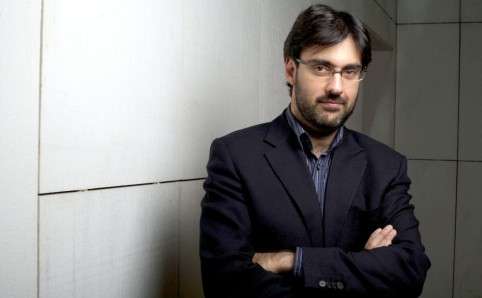|
Back
Sleight of Hand Cleveland
Severance Hall
02/11/2011 - & February 12*, 13, 2011
Modest Mussorgsky: Prelude to Khovanshchina
Jean Sibelius: Violin Concerto in D Minor Opus 47
Claude Debussy: Printemps, Symphonic Suite – Rondes de Printemps
Franz Liszt: Les Préludes, Symphonic Poem No.3
Leonidas Kavakos (violin)
The Cleveland Orchestra, Jun Märkl (conductor)

L. Kavakos (© Yannis Bournias)
A homecoming for the orchestra, after a tempestuous road trip in which winter storms caused them to be stranded in Ann Arbor and to miss the scheduled concerts in Chicago, ended with a last minute switch in conductors and a change in scheduled programs. Vladimir Jurowski fell ill and was advised not to travel and was quickly replaced by the irrepressible Jun Märkl who then substituted some Debussy and Liszt for Tchaikovsky’s Manfred Symphony. Although several of the principal players in the orchestra, including the concertmaster, first violist and first flutist were absent, the audience came out winners all around.
Maestro Märkl, from Germany via Lyon, France, who seems a combination of Seiji Ozawa and Leonard Bernstein in their younger years, bounded out on the stage of Severance, clearly delighted to be there. His enthusiasm was infectious and quickly spread throughout the hall. He opened the evening with the prelude to Mussorgsky’s unfinished second opera and used the color of the different instruments and sections in sweeping passages spinning out from a strong Russian melody.
Next up was the Violin Concerto in D minor by Jean Sibelius, played by Greek violinist and conductor, Leonidas Kavakos. Some murmuring was heard in the audience when he appeared, rather rumpled in black slacks and black shirt, not tucked in and sans tie. Looking as though he was going to engage in a casual practice session, his playing was private, almost introspective, as if he was playing a solo and the orchestra just happened to be there. Facing the audience, but unseeing, then the momentum of his upbows causing him to whirl around, facing the second violins, Mr. Kavakos, at times, was off of the ground! Although one might have expected such vehemence to lack subtlety, nothing could be further from the truth as even the super pianissimo notes could be clearly heard over the heavy thrumming of the double basses and the entire orchestra. It was impossible not to be drawn into his performance since not only the violin, but also the artist, was vibrating by the end of the final movement. The audience was drawn to their collective feet almost before the last note was sounded and after several curtain calls, Mr. Kavakos treated us to a brief encore of what sounded like a Greek folk melody. “Who is he?” was still being said during intermission, but with a sense of awe as opposed to amusement.
The second half of the program featured two pieces by Claude Debussy. Some lovely solos were played by Joela Jones (piano), Marisela Sager (flute) and especially Lynne Ramsey on viola. The evening concluded with one of Liszt’s Sinfonische Dichtung, or symphonic poems, a term he coined in 1854 to describe music that didn’t really follow any of the established classical forms and that could be related to a pictorial or literary work. While not a terribly outstanding work on its own, Maestro Märkl made it into something special with his driving form of conducting, seemingly everywhere at once, spreading the threads of the melodies and then weaving them together into a cohesive tapestry.
All in all, an interesting evening, made memorable by a dynamic conductor and an amazing soloist, both of whom I hope are invited back in the very near future.
Suzanne Torrey
|